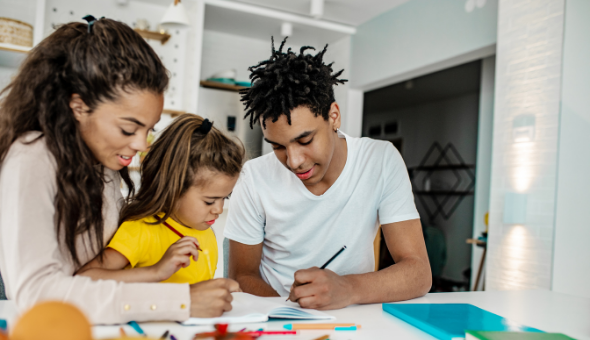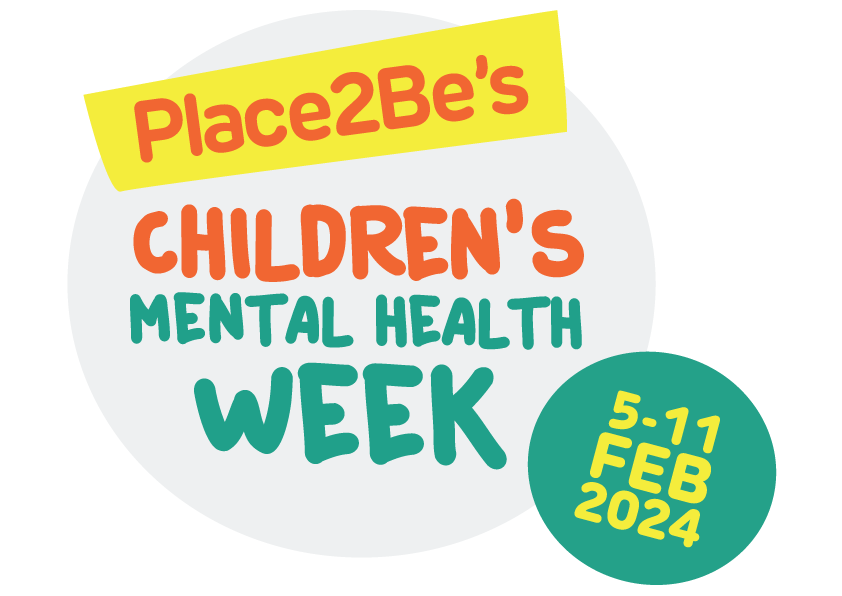
How parents and carers can support children's mental health and wellbeing
In a guest blog for Children’s Mental Health Week, Place2Be Trustee Professor Stephen Scott CBE writes about the role parents and carers can play in supporting their children’s mental health. Stephen is Professor of Child Health and Behaviour at King’s College London’s Institute of Psychiatry, Psychology and Neuroscience.
For better or worse, the way we are brought up makes a profound difference to who we are and how we get on in life. Think back to your own childhood and the influence your parents had. This might be good, with happy recollections of warmth and your mother or father (or both!) engaging with you in fun activities. And being there for you when you were upset, so you could talk through important issues in your life. And teaching you through example good values such as kindness and respect for other people, working hard and seeing tasks through to the end, and coping with setbacks by cheerfully bouncing back.
Moving forward, how should we be confident about the right way to bring up our children and support them? Times change, and what might have been good enough in our own upbringing may not meet our children's needs now. Maybe you're lucky enough to instinctively know how to do it, but actually, there is quite a good deal of skill to this. Unlike washing machines and wireless headphones, children do not come with a manual!
The good news is there are thousands of research studies with real-life parents and children showing what parenting styles maximise the chances of good outcomes, and hundreds of trials of parenting classes showing what works. The take-home message is that children and young people need love and limits.
By love I mean getting properly involved with your children for 20 or 30 minutes a day. It doesn't have to be longer, we are all busy. But if you can spend this special time, it will be a good investment. Responding sensitively to your child's signals with concern and interest will help them learn that you are there for them. Try to make lots of encouraging comments and praise their efforts, and you will see them continue persisting in what they're doing and playing in a more imaginative way. These skills can be deployed in many everyday situations, turning chores like cooking and washing-up into enjoyable, bonding activities. My own research shows that parents who do this, have children who are more securely attached to them, and more confident in new situations with other people and at school.
By limits I mean setting calm, clear boundaries. It is so easy when you are tired and busy to give in now and again, allowing your child to stay up late or have an extra biscuit. And if they start whingeing when you don't, but you eventually let them have their way, you are inadvertently teaching them that if they complain, they get what they want! Result: they will try complaining very loudly next time, since they have learned that it works! Keeping the tone calm really makes a difference to children. For example you can turn away from minor irritating behaviour and ignore them, they won't like this, but as soon as they are behaving half reasonably, turn back and make a positive comment. It is surprisingly effective. But if they are being more difficult, giving them a consequence, such as less screen time, or no bedtime story, or withdrawal of something else they want. Rather than shouting at them for more major annoying behaviour and rule-breaking, such as them having a major tantrum, create a quiet place to take them to (so-called "time out" or" time to calm down").
During lockdown with many children having to stay at home, the same principles apply. Of course it is harder all-round to stay calm, for both adults and children who are cooped up inside and not seeing friends. Try keeping clear routines, and both adults and children should try to engage in one each of PACE activities per day:
- Physical - going outside, or even doing a Joe Wicks type video exercise at home together promotes well-being, releases endorphins and reduces cortisol and other stress hormones.
- Achieve - doing something that leads to sense of achievement, be it for the child completing homework, or for the parent tidying a room. It is important to name the activity before and congratulate each other on getting it done.
- Connect - planning and then chatting to somebody important, even if it is online. Yes it is not the same as being face-to-face but it does make everybody feel better.
- Enjoyment - do something that you really like, and it doesn't have to be virtuous, it could be eating a slice of your favourite cake! Again, celebrating that you have done it is important.
We live in hard times, and all of these activities will take effort. Sometimes we may fail, so we shouldn't be too harsh on ourselves! The good news is if we can implement the strategies described above, it will help our children's general well-being and also reduce their risks for developing more serious mental health difficulties, such as feeling depressed or developing persistent behaviour problems. Onwards and upwards!
Free activity ideas for parents and carers
More advice on supporting your child's mental health
This blog was written in a personal capacity and does not necessarily reflect the view of the organisation.
